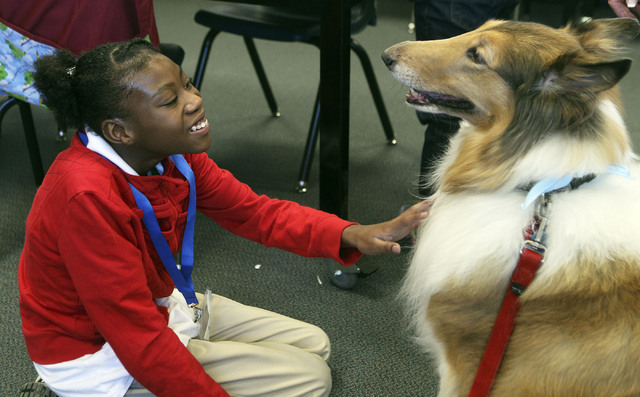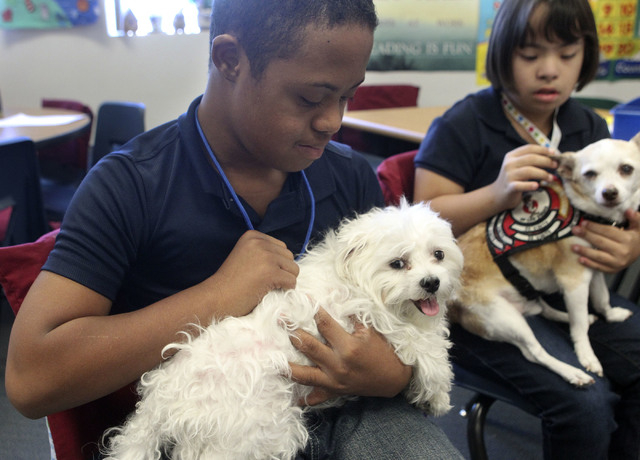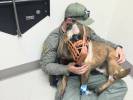Therapy dogs help bring special needs kids out of their shells
Tuesdays are 13-year-old Monica Nunez-Gutierrez’s favorite day. It is the day she gets to see one of her special friends, Rosie, a furry medium-sized Collie from the K9 Therapists of Las Vegas group.
Rosie and other dogs from the group visit Laura Rehfeldt’s special education class at Bailey Middle School, 2500 N. Hollywood Blvd., on Tuesdays. Children play with the dogs and read aloud to them in a partnership with Heaven Can Wait Animal Society’s Tales to Tails program.
“I like when the dogs come to the school,” Nunez-Gutierrez said. “Rosie is my favorite dog. She is so cute. We just love playing. I read to her, too. I read books about pumpkins.”
K9 Therapists of Las Vegas is a nonprofit club aimed at using dogs to provide emotional support, physical rehabilitation and joy for people in facilities and hospitals.
Rehfeldt educates children with learning disabilities who have difficulty with verbal, reading and social skills.
“Kids in my class have increased their ability to speak to others without being shy,” she said. “Dogs are not judgmental. Children can talk to dogs and become more comfortable talking to other people.”
Rehfeldt has been a longtime advocate of canine therapy. She previously taught at Monaco Middle School, 1870 N. Lamont St., where she used the program for her special education class for five years.
Rehfeldt said canine therapy demonstrated such positive results for her Monaco students that she carried the program over in 2009 to Bailey, where she teaches sixth through eighth grade.
“There are so many benefits with this program,” she said. “Kids have the ability to practice social skills with people they may or may not be familiar with. There are no scripted conversations, so some of my students who don’t respond are starting to become more verbal.”
According to the club’s website, k9tlv.com, the group formed in 1988 when Frances Arager, a rehabilitation nurse at University Medical Center, recognized the emotional benefits of canine therapy for her patients.
After her realization, the Humane Society started bringing its dogs on a trial basis. Patients soon started anticipating the events, and over the years, the program became a nonprofit organization.
The site says the most important study that has been linked to the success of canine therapy occurred at the University of Pennsylvania in 1980. Researchers studied a group of heart attack survivors and found that patients with pets lived longer after their recovery than patients without pets.
K9 Therapists of Las Vegas was formed in 1992 and has since been active at valley hospitals, rehabilitation centers, senior care facilities, hospices, convalescent homes and mental facilities.
Carol Bell, president of the group, and her Maltese. Sam, have been involved for seven years. Her partner, Robert Manning, and his dog, a motorcycle-riding Chihuahua named Little Harley, are also active members. They started by participating in the Tales to Tails program and then decided to reach out to different facilities.
“You don’t have to train a dog to become a member of K9 Therapists. It’s really the disposition of the dog more than ‘sit, come and stay,’ ” Bell said. “The dogs just have to be well-behaved and like a lot of attention. All the dogs here are very relaxed even with all of the interactions going on.”
Bell said there are 60 teams, each made up of one handler and one dog, in the program, but she is always looking for more.
“We are always in need of teams,” Bell said. “Within the last six months, we have received requests for dogs to accompany people while they are getting chemotherapy done. Recently we also started meeting with veterans that have (post-traumatic stress disorder).”
Laurie Watt, a volunteer, registered as a team with her Clumber Spaniel Matt through Therapy Dog Inc. She said they have been a team for two years.
“Matt just had the most amazing personality,” she said. “He’s so soft and cuddly, I figured that (becoming a therapy dog) would be something that he’d be great at.”
Watt learned about canine therapy when she attended a meeting centered on therapy dogs. She took Matt’s quiet and accepting personality as a good match for the job.
“Last year at a Halloween party, a woman at a nursing home leaned over from her wheelchair and grabbed Matt’s ears,” Watt said. “She pressed her face against his face and kept it there for several minutes. He just made her so happy.”
Betty Dymek, Rosie’s handler, was an early childhood special education teacher for 17 years. Dymek has volunteered with children who keep their fists clenched but will slowly open their hands to pet Rosie.
“She is so helpful to kids that need to learn how to work with their hands,” Dymek said. “It’s so fulfilling to come into a classroom and see a bunch of smiling faces.”
According to Bell, in order to register a dog as a therapy dog, a team must first be formed. The dog must be at least 1 year old, and the owner must have owned the dog for a minimum of three months. The dog should be current on immunizations and in good health. The dog must also go through a test that checks for temperament, interactions with other dogs and strangers and reactions to loud noises and medical equipment.
If the dog passes the initial tests, three observed visits to facilities will be prepared to check the behavior of the dog and the handler.
“I love being a part of this group because you get to do fun things and spend time with your friends,” Bell said “You don’t even have to do anything. The dogs do all of the work and bring a lot of happiness just by being there.”
For more information, visit k9tlv.com.
Contact Sunrise/Whitney View reporter Sandy Lopez at slopez@viewnews.com or 702-383-4686.





























